Tim Farron has announced his resignation as Liberal Democrat leader after he was repeatedly pressed during the general election over his personal beliefs on issues including homosexuality.
Farron issued a statement on Wednesday night saying he felt “remaining faithful to Christ” was incompatible with leading his party. It is understood several senior figures in the party had visited Farron in recent days to attempt to persuade him to step down, though he was initially reluctant.
“From the very first day of my leadership, I have faced questions about my Christian faith. I’ve tried to answer with grace and patience. Sometimes my answers could have been wiser.
“The consequences of the focus on my faith is that I have found myself torn between living as a faithful Christian and serving as a political leader,” he said in a televised statement.
“To be a political leader – especially of a progressive, liberal party in 2017 – and to live as a committed Christian, to hold faithfully to the Bible’s teaching, has felt impossible for me.”
He also hit back at some of the close scrutiny of him during the campaign, which saw him grilled repeatedly on questions such as whether he believed homosexual sex was a sin.
“I seem to be the subject of suspicion because of what I believe and who my faith is in. In which case we are kidding ourselves if we think we yet live in a tolerant, liberal society.”
Farron said he would serve as leader until the summer recess, and then trigger a leadership election.
Speaking on BBC Radio 4’s Today programme on Thursday, Simon Hughes, the former Lib Dem justice minister, said Farron’s position had become unfairly difficult. “It would be the same for people of other faiths who have strong faith views, where there are issues that are very controversial within that faith community,” said Hughes.
“It became unfairly difficult that Tim was put in the firing line and felt that he couldn’t adequately do justice to his faith while upholding the liberal values that he has argued for all his life.” The party’s home affairs spokesman, Brian Paddick, resigned from his post shortly before Farron made his announcement, citing concerns about the party leader’s views.
After Farron’s resignation, Paddick told the Guardian: “It is very sad that he feels he cannot be a committed Christian and leader of the Liberal Democrats.”
Paddick had said he was concerned about Farron’s views on various issues that were highlighted during the campaign. Throughout the election campaign, Farron was questioned over his attitude to homosexuality and abortion, though he insisted he did not believe gay sex was a sin and has said he was pro-choice.
The Lib Dems increased their number of MPs from nine to 12, after making overturning Brexit the central thrust of their campaign.
But they also lost seats, including Richmond Park, which was won by Sarah Olney just months earlier. Some of the party’s big beasts, including former ministers Vince Cable, Ed Davey, and Jo Swinson, returned to Westminster and could be potential leadership contenders.
Sean Kemp, former head of media for the Liberal Democrats and adviser to Nick Clegg, said he thought it was a shame because the party “needs someone to be a leader for a long time”.
“I hoped that was going to be Tim and I feel very sorry for him,” he added. “I wish he hadn’t made this decision but it was always going to be the most difficult issue for Tim as leader to balance his faith with what it means to be the leader of a liberal party in the 21st century.”
One senior Lib Dem source suggested that loyalty to the party had prevented people raising their concerns publicly during the election campaign.
Senior party figures believe the party’s election performance was significantly affected by stories about Farron, including in progressive metropolitan areas such as Sheffield Hallam and Leeds North West, where Clegg and his fellow Lib Dem MP Greg Mulholland lost their seats to Labour.
The party also failed to win back Bermondsey and Old Southwark in south London, where Simon Hughes lost ground in his former seat to Labour’s Neil Coyle, who took the seat in 2015.
One Labour MP described the furore around Farron’s views on homosexuality as “a gift on the doorstep” in areas where the party was battling the Lib Dems.
Many Lib Dem members had found Farron appealing, however, as a leader who did not come with the baggage of coalition. Cable, Davey and Swinson were all members of the coalition who backed unpopular measures, whereas Farron voted against tuition fees and the bedroom tax.
“It’s a dilemma,” a Lib Dem source said. “It’s an opportunity also to have a first female leader, but there are some who feel anybody as leader who was part of the coalition government would be poisonous. That’s the conundrum.”

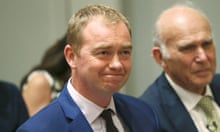
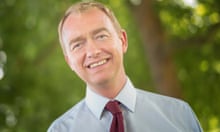



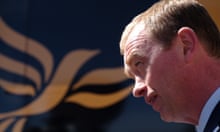
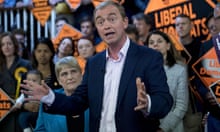

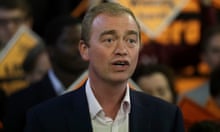
Comments (…)
Sign in or create your Guardian account to join the discussion